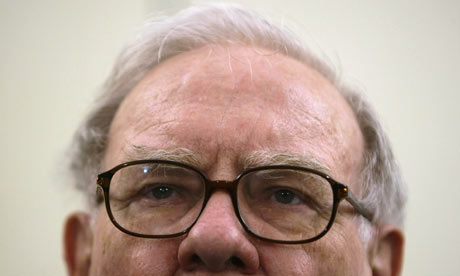
US investor Warren Buffett. Photograph: Andrea Comas /Reuters
Could a lost voicemail have changed the course of financial history? It's conceivable, in the case of Lehman Brothers and the legendary stockpicker Warren Buffett.
The world's second richest man has revealed that on the weekend of Lehman's spectacular collapse last year, Barclays' president, Bob Diamond, rang him to ask if he'd be willing to help with a rescue of Lehman.
When Buffett fielded the call on the evening of Saturday September 13, he was hurrying out to an engagement in Edmonton, Alberta. So he asked Diamond to get back to him with details later.
Diamond did, indeed, call back and left a message on the voicemail of the Sage of Omaha's cellphone. But the notoriously tech-unsavvy billionaire was unfamiliar with the workings of his handset and didn't notice that there was a message on it. With no offer forthcoming, Lehman proceeded to declare itself bankrupt and we all know the consequences to that fiasco.
A full 10 months later, according to Time magazine, Buffett asked his daughter, Susie, about a funny little symbol on the screen of his phone. It turned out to be Diamond with the lowdown on Lehman. There's a simple lesson to the story, Buffett told Fortune's Most Powerful Women summit in California: "Don't try to get in touch with me by cellphone."
Buffett has long been known as a technophobe - he prefers bricks and mortar investments such as Coca-Cola, See's Candies and Fruit of the Loom underwear to computers, cellphones and dotcom start-ups.
He's quite a dabbler in banks - he pumped $5bn into Goldman Sachs at the height of the crisis and he has positions in Wells Fargo and American Express. But it seems a little far-fetched that he would have stepped in as an eleventh hour white knight for Lehman.
For starters, if Buffett was really interested, he might have made a little more effort to keep in touch with Barclays. He's made his disdain clear for the kind of exotic derivatives that pushed Lehman into difficulties in the first place, famously branding them "financial weapons of mass destruction".
Plus, it's not clear precisely what he could have brought to the table - the reason Barclays ultimately backed away from a pre-bankruptcy buyout of Lehman was that the Financial Services Authority in the UK told the bank that it would need a shareholder vote before pressing ahead. The US government refused to provide a backstop against losses that might have permitted Barclays to take a short cut.

No comments:
Post a Comment